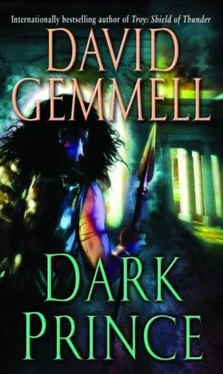The plan was essentially simple: remove all threats from within the kingdom by stealth or war.
He had established an early treaty with Athens, which enabled him to concentrate on crushing his enemies in the west and north. Now he had forged strong links with Thessaly in the south by destroying the Phocian army, which had ravaged central Greece.
But the storm-clouds still gathered. Philip's army had swept into the independent city of Amphipolis on his eastern border — a city Athens coveted. The shock invasion was not without its critics — including Pannenion.
'You promised Athens you would let them rule the city,' the general had pointed out.
'Not so. I told them I did not see it as Macedonian. There is a difference.'
'A small one,' replied Pannenion. 'You let them believe you meant them to take control. It will mean war with Athens. Are we ready for it?'
'It is a small risk, my friend. The Athenians are not rich enough to wage a full war at this distance. And I cannot allow Amphipolis to be a secret base for Athens.'
Parmenion had laughed then. 'There is no one else here, Philip. You do not need to take such a high tone.
Amphipolis is rich; she controls the trade routes to Thrace, and all of the southern reaches of the River Strymon. You are running short of coin, and the army must be paid.'
'There is that,' answered Philip, his grin infectious. 'By the way, the army is not yet large enough. I want you to train me ten thousand more men.'
The smile vanished from the Spartan's face. 'You already have more than enough to secure the realm. From where will come the danger? Thrace is divided, the three kings warring among themselves; the Paionians are finished, and the Illyrians will never rise to their former glory. You are building an army now of conquest — not defence. What is it you want, Philip?'
'I want ten thousand more men. And before you ask another question, my Spartan friend, was it not you who once advised me to keep my plans more secret? Very well, I am following your advice. No one but Philip shall know. And was it not also my strategos who lectured me on the nature of empire? We remain strong, he said, only while we grow.'
'Indeed he did, sire,' admitted Parmenion, 'but as with all strategies there is the question of scale. Armies must be supplied, lines of communication need to be open and swift. Your greatest advantage over Athens is that your commands are instantly obeyed, whereas the Athenians must gather their assembly and argue for days, sometimes weeks. And, unlike the Persians, we are not geared for empire.'
'Then we must learn, Parmenion, for the days of Macedon are here.'
Now Philip stared down at the map, his keen mind judging the areas of greatest danger. Parmenion had been right.
The taking of Amphipolis and other independent citadels had struck fear into the hearts of his neighbours, who were busy enlisting mercenaries, hoplites from Thebes, javeliners from Thrace, archers from Crete.
And Athens, in the distant south, had declared war, sending agents to all northern realms and cities urging them to stand against the Macedonian aggressor. Now that the Phocians were crushed the game was becoming complex, for no single enemy would dare raise his head above the ramparts and no single battle could solve Philip's dilemma.
His enemies would wait for a sign of weakness — then strike together, coming from east, west and south. If he moved against any one foe the others would fall upon his back, causing a war on two or more fronts.
The greatest immediate danger lay to the east, from Olynthos, the leader of the Chalcidean League of cities. Philip's finger traced over the trident-shaped lands of the Chalcidice. Between them the cities could raise 20,000 hoplites armed with spear, sword and shield, more than 3,000 cavalry and, perhaps, a further 7,000 — maybe 8,000 -
javeliners. A war with Olynthos would be costly and dangerous. Whoever won would be so weakened they would fall to the next aggressor. That was why the Olynthians were relying on the assassins they had sent to Pella.
The King heard the sounds of the Guards marching into the courtyard below his window. 'Walk with care today, Philip,' he warned himself.
* * *
Attalus gathered the ten members of the Royal Guard, inspecting their bronze breastplates and helms, their scabbards and greaves. They shone like burnished gold. Moving behind the lines, he glanced at their black cloaks. Not a trace of dust or grime showed. Satisfied, he walked back to stand before them.
'Be aware,' he said slowly, 'that the King is always in danger. Always . It does not matter that he walks in the heart of his realm. It is immaterial that the people love him. He has enemies. As you march behind him, keep your eyes on the crowd. Do not look at the King. Watch for any sudden movement. Is that understood?' The men nodded.
'May I speak, sir?' asked a man to his right.
'Of course.'
'Are you speaking in general terms, or is there a particular threat today?'
Attalus looked closely at the man, trying to remember his name. 'As I said, the King is always in danger. But it is a good question. Be vigilant.'
Taking his place at the centre, he waited for the King. The route would take them along the main Avenue of Alexandros, through the market-place and on to the Temple of Zeus. A walk of no more than a thousand paces, perhaps less, but the crowd would be pressing in. Attalus had stationed soldiers along the line of the parade, but they would be stretched to keep back the thousands of citizens. Philip's popularity was high and that made for great danger on a day such as this, for the people would be excitable — straining to touch him, pushing against the thin line of soldiers. Sweat dripped into Attalus' eyes. A trained assassin himself, he knew how easy it was to kill a man no matter how well protected. At no time would Philip be more than five paces from the throng. A sudden dash, the flash of a knife, the spurting of royal blood. .
For the hundredth time he pictured the route, the white-walled buildings and narrow alleyways.
Where would you make the attempt? he asked himself again. Not at the start when the guards would be at their most alert, but towards the end. Not near the temple, where open ground would prevent the assassins' escape. No. The attack would come close to the market-place with its scores of alleyways. Two hundred paces of sheer terror awaited him.
Damn you, Philip!
The King walked from the palace doors, the ten guards beating their fists upon their breastplates in greeting. Attalus was slow to follow, his mind preoccupied. 'I see you, Coenus,' said Philip, smiling at the man whose name Attalus had been struggling to remember. 'And you, Diron. I would have thought you'd have had enough of my company.'
One by one Philip greeted each of the men. It never ceased to amaze Attalus how the King memorized the names of the men under his command. Coenus — now Attalus remembered him. He had been promoted by the whoreson Parmenion to command the reserve phalanx at the Crocus Field.
'Are we ready?' asked the King.
'Yes, sir,' Attalus answered.
Two soldiers opened the gates and Philip strode from the palace grounds to be greeted by a thundrous roar from the citizens beyond. Attalus kept close behind him. Brushing the sweat from his eyes, he scanned the crowd. There were hundreds waiting here on both sides of the avenue. Flowers of every kind rained in on the King as he waved to his people. At the cross section the main parade was waiting: cavalrymen from Thessaly, ambassadors from Thebes, Corinth, Pherai, Olynthos and Thrace. Behind them were jugglers and acrobats, jesters and actors in masks of gleaming bronze. At the rear of the parade two white bulls, garlanded with flowers, were led on their last walk to the sacrificial altar of Zeus.
Читать дальше












